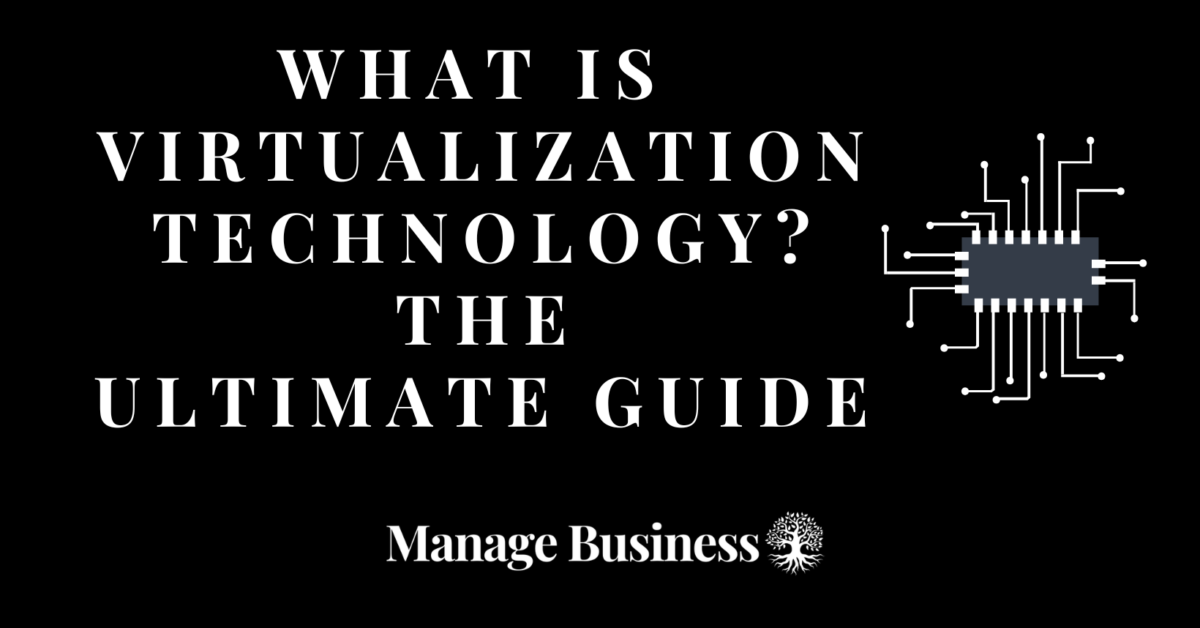Our content is reader-supported. We may earn a commission if you make a purchase through one of our links.
Last Updated on November 15, 2023 by Dr. Gabriel O’Neill, Esq.
The concept of virtualization has been going around since the 90s. However, it has become more prominent and practical in today’s world. This article will help give an in-depth understanding of how virtualization works, its benefits to businesses, and types of virtualization technology. Let’s get started!
What Is Virtualization Technology?
Virtualization technology plays a crucial role in shaping today’s fast-growing software-based industries. In simpler terms, it uses advanced methods to create a virtual version of a hardware unit.
This virtualization software creates an abstraction layer on top of your hardware that separates its resources from one another, such as memory, processor, and so on, between several other virtual computers. Therefore, you could virtualize numerous parts of your computer for a multitude of reasons.
How Does This Technology Work?
Interpreting how virtualization technology works is a bit more complex than that. A virtual computer system is set up using highly specialized software known as hypervisors.
Hypervisors use physical means to allow us to operate and share system resources, in order to support several guest virtual machines. These machines mainly include legacy software, mail server, and web resources, all of which work together in coherence at maximum capacity.
They are independent of one another, thus which makes it feasible for us to run a number of servers on a single physical server.
Benefits of Virtualization to Organizations
Virtualization technology provides a myriad of benefits to organizations and individuals in general.
1. Efficiency
The virtual machine comes with an easy interface and since it reduces the number of physical servers, the IT team would not have to waste their time on maintaining the physical machines.
Moreover, we can execute any task within the premises of a virtual environment, thus increasing productivity.
2. Security
As ways of hacking have become increasingly attainable, it has made it difficult for us to secure data. However, virtualization eliminates this problem, as it allows us to use virtual firewalls to protect our data from various threats.
Furthermore, it enables automated provisioning, which provides more security to virtual applications and to physical ones as well.
3. Cost Savings
The costs regarding the virtual system are mostly misconstrued. In reality, it is not expensive and uses less hardware to run.
4. Scalability
It is possible for us to scale our virtual cloud environment with the use of virtualization technology. This scaling can also be automated as needed to make sure that appropriate resources are available.
5. Reliability
A major issue for organizations arises when they accidentally lose their data. However, with virtualization technology, we can rely on the virtual environment to effectively handle recovery operations and execute any sort of backup or retrieval processes.
Types of Virtualization Technologies
Generally, there are seven types of virtualization technologies.
1. Desktop Virtualization
This is a type of virtualization technology where a desktop operating system, such as Windows, operates on a physical server as a virtual machine. Desktop virtualization permits a primary administrator to establish several desktop environments for multiple physical devices synchronously.
2. Network Virtualization
This type of virtualization reproduces a physical system that enables several other applications to operate on a virtual network with additional features.
3. Server Virtualization
This virtual technology helps organizations run numerous operating systems as strong virtual machines on a single physical server. This results in better utilization of servers since they share the resources of a physical server. VPS hosting uses the same technology.
Therefore, the outcome is increased IT efficiency and a reduction in operation costs. In addition to that, it also enhances workload deployment and boosts the performance of applications.
4. Data Virtualization
Data virtualization is a unique form of technology. It modifies data to our specific requirements, by allowing us to gather data from different sources. This lets us treat several data sources as one.
5. Operating System Virtualization
This type of virtualization technology is directly related to the primary task manager of the particular operating system known as the ‘kernel.’ By using this, we can easily operate Windows and Linux in correspondence with one another. The outcome of this is reduced hardware costs and stronger security.
6. Storage Virtualization
Storage virtualization is significantly beneficial for storage purposes. This technology provides a single virtual storage device by assembling multiple physical storage.
7. Application Virtualization
This technology uses specific software to make it feasible for an application to be available everywhere. Both the operating system and software application are split up, hence they run in an isolated space known as the ‘sandbox.’
Conclusion
Virtualization technology is the future of technology, which is undoubtedly creating a drastic change in the landscape of the tech world. As discussed above, this technology provides a wide range of facilities to the IT department of an organization.
It is severely influencing businesses and enterprises, as they are already shifting their infrastructures to virtual systems. Also, virtual machines provide an optimal level of a secure environment for your private data, as well as keep everything optimized. As a result, this allows us to utilize resources efficiently.
Lastly, this technology also saves your time and hardware resources, while increasing the performance of the system.
About the author
Dr. Gabriel O'Neill, Esq., a distinguished legal scholar with a business law degree and a Doctor of Juridical Science, is a leading expert in business registration and diverse business departments. Renowned for his academic excellence and practical insights, Dr. O'Neill guides businesses through legal complexities, offering invaluable expertise in compliance, corporate governance, and registration processes.
As an accomplished author, his forthcoming book is anticipated to be a comprehensive guide for navigating the dynamic intersection of law and business, providing clarity and practical wisdom for entrepreneurs and legal professionals alike. With a commitment to legal excellence, Dr. Gabriel O'Neill, Esq., is a trusted authority dedicated to empowering businesses within the ever-evolving legal landscape.
